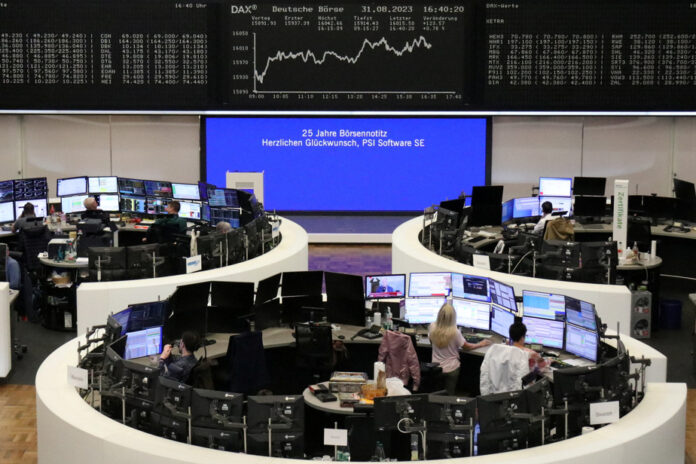(Paris) Global stock markets remain cautious on Friday ahead of the US jobs report, crucial for the US central bank, at the end of a busy week of macroeconomic releases.
European stock markets rose after an opening in the red: around 6:20 a.m. (Eastern time), Paris advanced by 0.16%, Milan by 0.08%, only Frankfurt fell further by 0.07%. London was up 0.55%,
Wall Street was heading for a slight rise at the open between 0.2% and 0.3% for the three major indices according to the futures.
The week was driven by economic indicators, including the latest inflation data from both Europe and the United States, which showed that the fight against rising prices led by central banks was far from over.
Inflationary pressures remain, be it energy prices, still-strong consumer spending in the United States or a still-tight labor market.
“Disinflation is not a long calm river,” note analysts at Banque Postale AM. “The latest inflation figures do not challenge the trend […], but they do illustrate that the speed and magnitude of inflation’s decline will not always be as sharp and rapid as before the summer “.
But U.S. jobs data for the week showed conditions for finding a job were tightening slightly, bolstering hopes that the Federal Reserve will leave key rates unchanged at its next meeting in September.
Investors now await the official monthly US jobs report, “the most important economic statistic of the month,” according to John Plassard, investment specialist at Mirabaud.
“A weaker-than-expected job openings number, a slight deterioration in the jobless rate, or weaker-than-expected payroll data could reinforce the idea that the Fed will take a break at the September meeting, and may also be at the November meeting,” writes Swissquote analyst Ipek Ozkardeskaya.
In Asia, the Tokyo Stock Exchange gained 0.28%, with the Nikkei index posting a weekly gain of 3.4%. Shanghai gained 0.43% while the Hong Kong Stock Exchange was shut down as Super Typhoon Saola approached.
Investors have welcomed a series of measures from Beijing meant to stimulate the purchase of real estate to revive a key sector of the world’s second largest economy. In addition, manufacturing activity in China recovered in August, at its highest rate for six months.
A note from UBS analysts has cast a chill over the entire European automotive sector a few days before the start of the Munich show. The bank notably downgraded the manufacturer Renault (-5.02% in Paris), and Volskwagen (-3.45% in Frankfurt) due to Chinese competition. BMW also fell by 1.72%, Mercedes by 1.27%, Stellantis by 0.55%.
Oil prices continued to rise on Friday, pushed by expectations of a further extension of production cuts from Saudi Arabia and Russian exports for the month of October.
A barrel of Brent from the North Sea, for delivery in November, which is the first day of use as a reference contract, took 1.12% to 87.80 dollars around 6:10 a.m. (Eastern time). ).
Its American equivalent, a barrel of West Texas Intermediate (WTI), for delivery in October, gained 1.11% to 84.56 dollars.
The two global oil benchmarks are on track for a strong weekly gain, between 4% and 6%, and are trading at levels close to their highest prices of the year.
The euro barely rebounded against the dollar (0.05%), at 1.0848 dollars per euro.
Bitcoin was almost flat (0.07%) at $26,030, after a sharp decline on Thursday.















